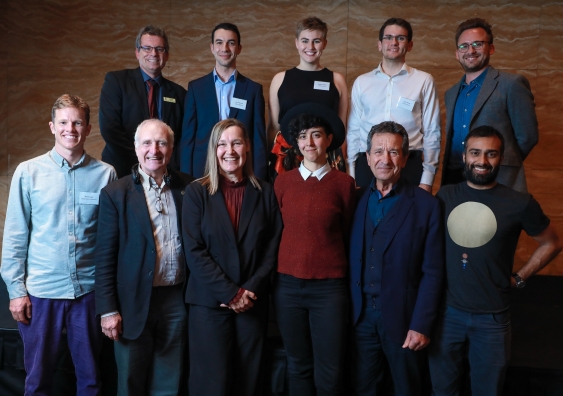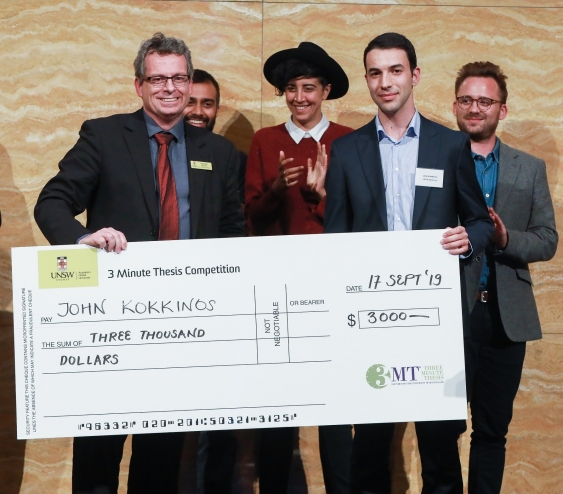Pancreatic cancer research takes centre stage in 3 Minute Thesis Final
Nanomedicine presentation earns PhD candidate John Kokkinos top prize at UNSW 3MT grand final.
Nanomedicine presentation earns PhD candidate John Kokkinos top prize at UNSW 3MT grand final.

Neil Martin
+61 293850790
n.martin@unsw.edu.au
UNSW Sydney’s most exciting doctoral research has been showcased as 22 students took part in the 3 Minute Thesis Final on Tuesday evening.
PhD candidates had just 180 seconds, and a single Powerpoint slide, to explain their research in a clear and concise manner - and demonstrate why it is so important.
With $3,000 on offer for first prize, the academic competition was fierce - as research candidates consolidated their ideas and distilled their discoveries down to a comprehensible bite-size presentation.
Special guests included representatives from UNSW’s outreach ASPIRE program – consisting of Year 10 and 11 students from Chester Hill and Auburn Girls high schools – who selected their own favourite.
John Kokkinos won the main prize, decided by a panel of distinguished judges, for an engaging presentation about his research into the treatment of pancreatic cancer using gene silencing nano-drugs.
The judges - science journalists Robyn Williams and Carl Smith, physicist Dr Niraj Lal, video producer Tania Safi, education officer Dr Christine Evans and business leader and UNSW alumni Bill Manos – were captivated by the way Kokkinos explained how new therapeutic approaches were creating a kind of “civil war” inside pancreatic cancer cells.
Dr Evans told the winner: "It was just an outstanding presentation. From the very beginning, we were enthralled. We understood the importance of your research. The analogies you used were very relevant and the image on your slide complimented what you were saying.
"The cohesiveness of your presentation was impressive and resonated with all of the judges."

3 Minute Thesis Final winner John Kokkinos (right) receives his prize from Professor Jonathan Morris, Dean of Graduate Research at UNSW. Image by Maja Baska.
Second place and $1500 went to Georgina Carson for her presentation about developments in quantum computing, while Liam Cheney claimed $500 for third place after skilfully explaining the importance of tracing where cholera infections originate.
3MT winner John Kokkinos will now represent UNSW in the Asia Pacific competition at the University of Queensland, as well as the international Universitas 21 final – a virtual event with judges watching video presentations.
“It's a great honour to be given the first prize. This is a reflection of my great supervisors and all their mentoring over the years. And it's my passion for the research, which I think came out today,” Kokkinos said.
“I think as scientists we need to be able to speak about our research to a lay audience and to communicate our findings to the community because they're the ones we invest in - we're doing it for them, so they need to understand what we're doing.
“It's a massive challenge to eliminate pancreatic cancer, but that’s the aim. We are making progress and hopefully we can make a difference in this field.”
The $500 Aspire prize, as awarded by Chester Hill and Auburn Girls high school students, went to Simon Lloyd for his presentation into research that aims to reduce water contamination and make urban rivers safe to swim in and enjoy for other recreational activities.
UNSW Chancellor David Gonski AC said: "This competition is one of the best things we do at this university. UNSW's motto - Manu et Mente - highlights there is a mixture of theory and practice. And what these presentations do is show how wonderfully we are progressing along that line.”
Professor Jonathan Morris, Dean of Graduate Research, added: "Every year I think the competition can't get any better, and every year it does - so congratulations to all the finalists.”